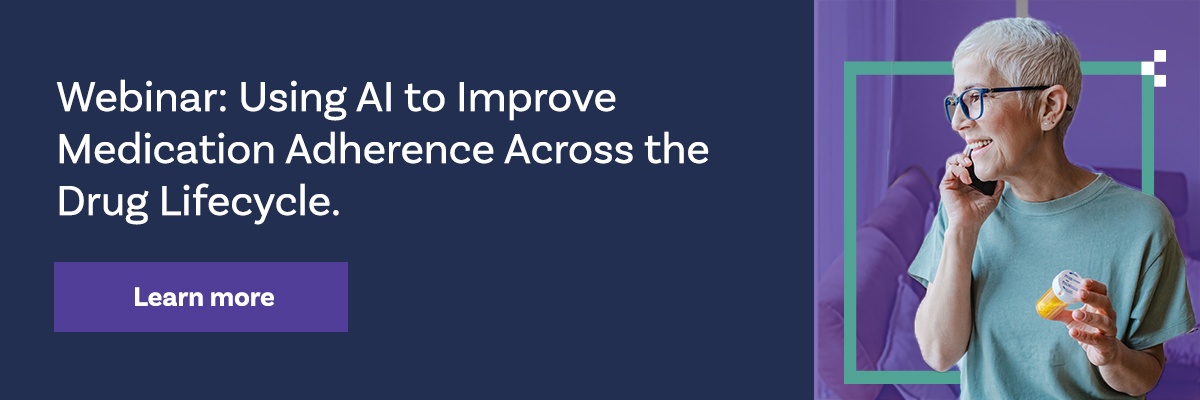Starting and staying on prescribed specialty drugs is essential for managing and treating chronic and complex conditions. However, pharmaceutical companies face a myriad of unique challenges in medication initiation and adherence to specialty drugs. In fact, a study on specialty populations revealed that 58 percent of patients were non-adherent to drugs for treating chronic conditions. These gaps in therapy can have detrimental effects on patient outcomes.
With that said, pharmaceutical companies can still improve medication adherence rates with the right technology and a predictive, personalized approach to patient engagement. Learn the steps you can take to maximize adherence to specialty drugs:
The Challenges of Improving Medication Adherence to Specialty Drugs
Improving medication adherence requires pharmaceutical companies to have a comprehensive understanding of the barriers that lead to non-adherence. The most common reasons for non-adherence to specialty drugs include:
Cost Barriers
High drug costs are a significant barrier to medication adherence—especially for specialty drugs. The average cost per specialty claim rose from $4,879 in 2018 to $5,029 in 2019, and these numbers are likely to continue rising in years to come.
Access Barriers
Access to specialty drugs is also a barrier to medication adherence. Because most specialty medications are dispensed at specialty pharmacies due to handling and monitoring requirements, they’re often not as readily available to patients. As such, specialty drug access challenges can lead to issues with therapy initiation and adherence, impacting patient outcomes.
Administration Barriers
Many specialty drugs have challenging administration requirements. For example, injections and infusions are specialty medications that are difficult for patients to administer themselves. This can also create medication adherence challenges for specialty drug pharmaceutical companies. Often there is a need for support and education from a healthcare professional.
In addition to recognizing medication adherence barriers, developing a clear understanding of the consequences of non-adherence is also critical to effectively educate patients on improving adherence. Although consequences can be detrimental for non-specialty drugs as well, they’re even more prominent for medications to treat chronic conditions that use specialty medications, such as cancer, rheumatoid arthritis, multiple sclerosis, and more.

Medication Adherence Support for Specialty Drugs
Similar to specialty pharmacies and prescribers, pharmaceutical companies are also committed to improving medication adherence rates for specialty drugs and closing gaps in therapy. Here’s how:
Financial Assistance Programs
Many pharmaceutical companies offer financial assistance programs for patients who cannot afford the cost of specialty drugs. Many pharmaceutical companies offer financial assistance programs for patients who cannot afford the cost of specialty drugs. Pharmacy rebates, co-pay cards, and high-cost specialty drug management programs can all ease the financial burden for patients who are uninsured and underinsured, aiding in patient outcomes.
Specialty Pharmacy Access
Finding and building a relationship with a specialty pharmacy can also help improve medication adherence. In many cases, pharmaceutical companies partner with specific specialty pharmacies to improve patient access and medication adherence. These specialty pharmacies often have programs that help with reminding patients about their medication refills and have staff available to support patients and caregivers.
Patient Support Programs
Patient support programs are a great way to educate patients and intervene when they fail to adhere to prescribed specialty drugs. Pharmaceutical companies are beginning to see the role artificial intelligence (AI) plays in deploying more effective, personalized communications to boost medication adherence and patient engagement.
Leveraging AI to Maximize and Improve Specialty Drug Adherence
AI empowers healthcare organizations to improve the effectiveness of patient support programs focused on increasing therapy initiation, medication adherence, and overall persistence. In leveraging AI, pharmaceutical companies can use predictive analytics to refine and personalize patient support programs, helping deliver the right outreach via the right channels to the right patient at the right time.
For example, many modern patient support programs incorporate omni-channel technologies, including channels ranging from text messages and in-app notifications to phone calls and in-person conversations. Some patients require higher-touch communications—such as in-person consultations to provide education on various specialty drugs and disease states—whereas others benefit more from simple text message or email reminders to take and refill their medications.
Curious about using AI to improve your patients’ initiation and adherence to specialty drugs? Schedule a demo to see AllazoHealth’s AI in action.
